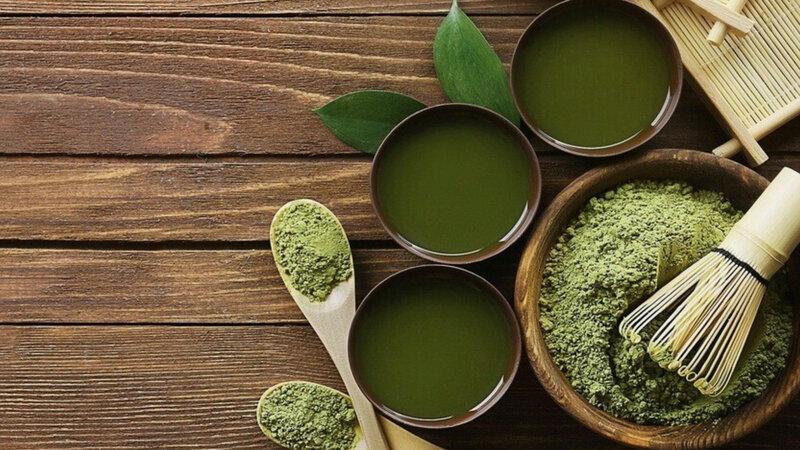6 Health Benefits Of Matcha Tea – Is Matcha Good for You?
Matcha tea, although recently popularized by celebrities, has been a prominent part of Japanese ceremonies for centuries. Derived from the Camellia sinensis plant, the same plant as green tea, matcha tea contains higher levels of nutrients and proteins due to its concentration.
How do we get matcha tea?
To obtain matcha tea, farmers cover the tea plants for 20 to 30 days before harvest. This process boosts chlorophyll production, enhances amino acid content, and gives the tea its distinctive dark green color.
After harvesting, the leaves are steamed, dried, and then milled into a fine powder. This milling process increases the caffeine and antioxidant content of the tea, while also providing its characteristic powdered form.
How do Incorporate matcha tea into your diet?
Incorporating matcha tea into your diet is simple. Mix 60 to 120 ml of almost boiling water with 1 to 2 teaspoons of matcha powder. When the mixture appears sparkling, it is ready to consume.
Matcha tea can be enjoyed in various ways such as matcha latte, smoothie, or yogurt. It is recommended to consume one or two cups of matcha tea per day, preferably opting for certified organic varieties to maximize its benefits and minimize any potential side effects.
Matcha tea offers several notable benefits, as supported by various studies:
1. Natural Antioxidant
Matcha tea is rich in catechins, which are plant compounds acting as natural antioxidants. These catechins help stabilize harmful free radicals in the body, which can otherwise lead to chronic diseases. Matcha contains up to 137 times more certain catechins compared to other types of green tea.
2. Liver Protection
Studies have indicated that matcha tea can contribute to liver health by reducing liver enzymes, lowering the risk of non-alcoholic fatty liver disease, and minimizing the chances of liver disease.
3. Enhanced Brain Function
Matcha tea contains L-theanine, a compound that interacts with caffeine to promote alertness, induce relaxation, reduce stress levels, and prevent energy crashes commonly associated with caffeine consumption. Additionally, it has shown improvements in reaction time, memory, and brain function, particularly among the elderly.
4. Cancer Prevention
Matcha tea is abundant in polyphenols and antioxidants, including Epigallocatechin-3 (EGCG), a type of catechin known for its potent anti-cancer properties. Test tube and animal studies have demonstrated EGCG’s effectiveness in preventing skin, prostate, lung, liver, and breast cancers.
5. Heart Health
By maintaining a balanced diet, leading a healthy lifestyle, and consuming matcha tea, individuals can promote heart health and reduce the risk of heart disease and stroke. Matcha has been shown to lower total and LDL (“bad”) cholesterol levels, as well as triglycerides.
6. Weight Loss Aid
Many weight loss supplements contain “green tea extract” as an ingredient. Numerous studies suggest that matcha tea can boost metabolism, increase energy expenditure, enhance fat burning, and aid in weight loss. Since matcha originates from the same plant as green tea, it shares these potential effects.
7. Detoxification
Matcha tea is believed to have detoxifying effects on the body. The high levels of chlorophyll in matcha help to eliminate toxins, heavy metals, and harmful chemicals from the body.
8. Energy and Focus
Matcha tea provides a calm and sustained energy boost without the jittery side effects often associated with other caffeinated beverages. It contains a combination of caffeine and L-theanine, which promotes a state of alert relaxation, enhances focus, and helps improve concentration.
9. Immune System Support
The antioxidants present in matcha tea, including catechins and EGCG, help to strengthen the immune system and protect against various diseases and infections. Regular consumption of matcha tea can support overall immune function.
10. Anti-Inflammatory Properties
Matcha tea has been found to have anti-inflammatory effects on the body. The antioxidants in matcha help reduce inflammation, which is linked to chronic diseases such as heart disease, arthritis, and certain types of cancer.
11. Oral Health
The catechins in matcha tea have antibacterial properties that can help fight against oral bacteria, reducing the risk of tooth decay, gum disease, and bad breath. Matcha tea is also believed to promote overall dental health.
12. Stress Reduction
The combination of L-theanine and caffeine in matcha tea has a calming effect on the mind and can help reduce stress and anxiety. It promotes a sense of relaxation and mental clarity.
13. Skin Health
The antioxidants in matcha tea can benefit the skin by helping to reduce inflammation, fight against free radicals, and promote a youthful appearance. Some people even use matcha tea topically in face masks or skincare products.
14. Digestive Health
Matcha tea contains dietary fiber, which aids in digestion and promotes a healthy digestive system. It can help regulate bowel movements and support overall gut health.
15. Hydration
While matcha tea does contain caffeine, it still contributes to overall hydration due to its liquid content. Staying properly hydrated is essential for maintaining various bodily functions and overall well-being.
In summary, matcha tea offers a range of health benefits, including its antioxidant properties, liver protection, brain function enhancement, potential cancer prevention, heart health promotion, and weight loss support. Incorporating matcha tea into your daily routine can be a healthy addition to your diet.






















